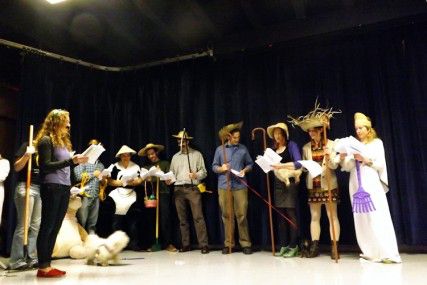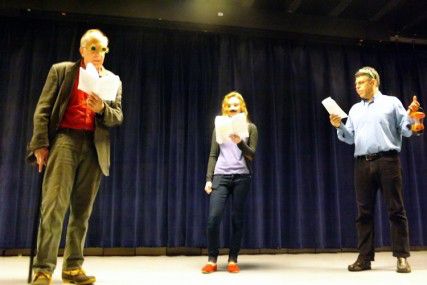
“To offer you ‘greetings,’ fellow demesmen, is now old-fashioned and worn out; but I do say, ‘Wazzup!’ for turning up here so eagerly, so painstakingly, and so energetically, back me up now, in the work that lies ahead.”
Wazzup? Demesmen? This kind of juxtaposition might sound all Greek to you — probably because it is. Last week, the Department of Classical Studies and the College of Arts and Sciences Core Curriculum staged their annual Aristophanes reading, performing Plutus, otherwise known as Wealth.
What began as a simple round-table reading in the classics library has since escalated into a yearly ancient Greek extravaganza of comedy, improvisation and entertainment. For more than 15 years, undergraduate classics and Core Curriculum students have worked with professor and department chair of classical studies Stephanie Nelson to perform modern-joke filled productions of Aristophanes’ ancient stories.
“I love going through the plays and figuring out what’s going to make it funny, what’s going to make it work, “ Nelson said. “Every year, I say, ‘this is the last year, I’m not going to do it again,’ but it’s really the actual production, and that feeling at the show, with everyone just working together and laughing and having such a great time [that keeps me coming back].”
Written at the end of the 4th century BCE, Aristophanes’ Wealth tells the story of a poor Athenian farmer named Chremylus (Sarah Weiskittel, CAS and Arvind and Chandan Nandlal Kilchand Honors College junior) and his clever slave Cario (Stephen Esposito, classical studies professor), who set out to restore sight to the blind, beggarly god Wealth (Stephen Scully, classical studies professor and director of graduate studies in classics) so that he may carry out his reclamation of money from the undeserving and the redistribution of that money to make the “just, wise, and decent people” rich. Hilarity and trouble ensue as the goddess Poverty (Patricia Johnson, classical studies professor and associate dean of the faculty for the humanities) arrives and warns Chremylus about the impending dangers of redistributing the wealth. By the end of the play, the Olympian gods have become angry and hungry, as the so-called “just” have proceeded to offer all of their sacrifices to Wealth in honor of their newfound riches.
This rendition — based on Greek language and literature professor Jeffrey Henderson’s bawdy and honest translation of the play — included a few obvious changes, and undergraduates work with Nelson to cast the faculty, find costumes, and edit the lines to include modern, relevant jokes about life at BU. In the process, corrupt Wall Street bankers, jokes about School of Management students dishonoring Zeus and Tootsie Rolls that fly across the room all made their way into this version.
Students do most of the behind-the-scenes work, and they share their own set of jokes as they sift through piles of feather boas and Mardi Gras beads, draw deadpan signs to be carried across the stage and refuel with the infamous mashed potato-and-bacon pizza from Otto’s.
“My favorite part is assigning the roles to the professors, because sometimes you find one that just fits them perfectly, and it’s always funny seeing them on stage with wigs and funny lines,” said Weiskittel, an Ancient Greek and Latin major who has played the lead role for the past two years.
That’s all part of the plan — to poke fun at the faculty and to engage in a reversal of roles, where the students have the upper hand.
“It’s always really fun,” Weiskittel said, “but the intimidating part is all the things you end up saying and doing in front of your professors, especially if you insult them. It can be a little unnerving, but they’re all pretty good sports about it.”
As with all comedy, however, things sometimes don’t go exactly as planned.
“Everybody does this — they drive you absolutely crazy. Nobody ever looks through their scripts ahead of time,” Nelson joked.
When asked if the show would be as funny if the students and faculty actually studied their lines and made the production a serious theatrical endeavor, however, she offered up an enthusiastic “no,” along with a genuine, knowing laugh.

Despite all of the jokes, the classical backdrop can be misleading. As a discipline that takes its fair share of heat for being useless and impractical, one has to wonder, why sit through an hour and a half of wisecracks about Greek slaves, divine disputes, and choral odes? Aside from the traditional free pizza and the crowd-pleasing opener Fish Worship, the BU-affiliated blues band, that is.
“For me personally, what I like seeing is that something that was written so long ago in the 4th or 5th century can be performed today and can still be funny and still be interpreted in modern times,” said Weiskittel.
Aristophanes’ comedies let us know it’s okay to laugh at ourselves and laugh at each other, as long as it’s all in jest. Who doesn’t need to be reminded of that every once in a while, especially in a time when political, social, and economic turmoil seems to consume our thoughts day after day without hope for a better future? Wealth is all too fitting a backdrop for this kind of catharsis — a simultaneous acknowledgment of both the good and the bad we experience in our everyday lives.
“Montaigne has a great line — he says no matter how high the throne, you’re always sitting on your own rear end,” Nelson said. “That ultimately, we’re all human beings, and that all human beings have certain physical things that happen to them no matter how high and important they are … Someone laughing at somebody can be the worst way to mark them off as a way of rejecting them, but laughing with somebody can be the biggest kind of cooperation.”
The second kind of laughter is what the Department of Classical Studies and the Core Curriculum set out to achieve every year, and given our current political climate and the topical matters addressed in Wealth, this year may have succeeded more than others. By encouraging the audience to laugh together at critical current events on both the national stage and right here at BU, this year’s production of Wealth gave students and faculty alike the opportunity to laugh with each other about each other.
This is an account occasionally used by the Daily Free Press editors to post archived posts from previous iterations of the site or otherwise for special circumstance publications. See authorship info on the byline at the top of the page.



